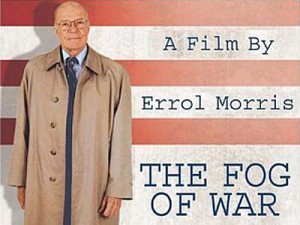 Christopher Wakling’s new novel, What I Did, is a brilliant, dark and often excruciatingly funny journey into a family nightmare. Narrated by a six-year-old boy obsessed with the animal kingdom, it has been the recipient of scintillating reviews, was nominated for the Booker Prize and is fast becoming a book club favourite. I talked to the author – who is also a respected teacher of creative writing – about what it takes to write through a child’s eyes, and what can happen to you when you do. Continue reading
Christopher Wakling’s new novel, What I Did, is a brilliant, dark and often excruciatingly funny journey into a family nightmare. Narrated by a six-year-old boy obsessed with the animal kingdom, it has been the recipient of scintillating reviews, was nominated for the Booker Prize and is fast becoming a book club favourite. I talked to the author – who is also a respected teacher of creative writing – about what it takes to write through a child’s eyes, and what can happen to you when you do. Continue reading
Category: public policy
Why every city needs an Empathy Museum
 Just as the world’s major cities now have Holocaust Museums, it is time they all established Empathy Museums too. Their purpose would be nothing less than generating a new global culture of empathy by creating adventure spaces where you can explore how to view life from the perspective of other people.
Just as the world’s major cities now have Holocaust Museums, it is time they all established Empathy Museums too. Their purpose would be nothing less than generating a new global culture of empathy by creating adventure spaces where you can explore how to view life from the perspective of other people.
A typical Empathy Museum would not house dusty exhibits inside glass cases. Instead, it would be an exciting and intriguing playground rivalling the finest galleries and tourist attractions that the city has to offer. On rainy Sunday afternoons you might wander through the Empathy Museum with a few friends or your mother-in-law. During the week it is likely to be filled with children on school excursions and inquisitive visitors from countries where the ideal of empathy remains embryonic. The Empathy Museum will ignite the imagination just like the first public museums in the seventeenth century, whose collections of curiosities revealed the wonders of nature and human civilization for the first time. Continue reading
The day empathy saved the world
If you’ve ever sat up late wondering if empathy can save the world, I have good news for you. It can. Well, that is according to Robert McNamara, US Secretary of State from 1961 to 1968. In the Academy Award winning documentary The Fog of War: Eleven Lessons from the Life of Robert S. McNamara, the former bigwig in the Kennedy and Johnson administrations – who died last year aged 93 – reveals what he learned about war and foreign policy during his political career. The surprising first lesson is this: ’empathize with your enemy’.
McNamara makes his point through an account of the Cuban Missile Crisis in 1962. He begins by describing the dilemmas faced by the Kennedy administration. Should they use military force to take out the Soviet nuclear weapons that would be pointing at 90 million Americans from Cuban soil? And if they attempted to do so, would the Russians press the nuclear button? One of Kennedy’s advisors was Tommy Thompson, a former US Ambassador to Moscow who knew Krushchev personally. He argued that Krushchev was unlikely to attack, and that they should hold back from military action. Thompson was recorded as saying at the time: ‘The important thing for Krushchev, it seems to me, is to be able to say, “I saved Cuba, I stopped invasion.”’ Luckily Kennedy followed Thompson’s advice and catastrophe was averted. This is McNamara’s comment on the episode:
In Thompson’s mind was this thought: Khrushchev’s gotten himself in a hell of a fix. He would then think to himself, ‘My God, if I can get out of this with a deal that I can say to the Russian people: “Kennedy was going to destroy Castro and I prevented it.”’ Thompson, knowing Khrushchev as he did, thought Khrushchev will accept that. And Thompson was right. That’s what I call empathy. We must try to put ourselves inside their skin and look at us through their eyes, just to understand the thoughts that lie behind their decisions and their actions.
Empathy, for McNamara, was a strategic weapon of the Cold War. It was one of their ways of beating the Russians. If you understand your enemy better than they understand you, then you are more likely to be victorious. Later in the film he laments that, ‘In the case of Vietnam, we didn’t know them well enough to empathize…we saw Vietnam as an element of the Cold War. Not what they saw it as: a civil war.’ That’s why the US failed.
The Cuban Missile Crisis can be seen as a moment when empathy saved the world. Without Tommy Thompson’s empathic imagination, Kennedy may have opted for military action and the Cold War could have turned into a very hot one. But it also raises questions about the meaning of empathy. Are we willing to tolerate an approach to empathy that permits it to become a strategic weapon of war?
McNamara is really talking about a cynical and self-serving form of empathy that I call ‘instrumental empathy’, which is used to promote personal interests. It is certainly not monopilised by politicians. Crafty casino owners use instrumental empathy to enter the mindset of gambling addicts and design slot machines that will fleece them of their cash. Psychopaths may make a similar mental leap into the minds of their victims in order to manipulate their fears.
McNamara gives empathy a bad name. Instead of using it as an instrument of personal gain, we should promote a more benign approach to empathy that expands, rather than diminishes, our humanity.
In case you a curious, here is the extraordinarily powerful clip on the Cuban Missile Crisis from The Fog of War. As well as music from Philip Glass, it contains original recordings of the discussions that took place between Kennedy, McNamara, Thompson and other top White House aides during the tense days of October 1962:
Do we suffer from compassion fatigue?
The British photojournalist Don McCullin has just turned seventy-five. During a career that has now spanned half a century, perhaps his most unforgettable photograph is of an emaciated albino boy in the Biafran War in Nigeria, taken in 1969. He is leaning over on skeletal legs with an abnormally large head, clutching an empty tin of corned beef. I have never seen an image like it and, at the time, neither had most of the Western world. Here is the photo:
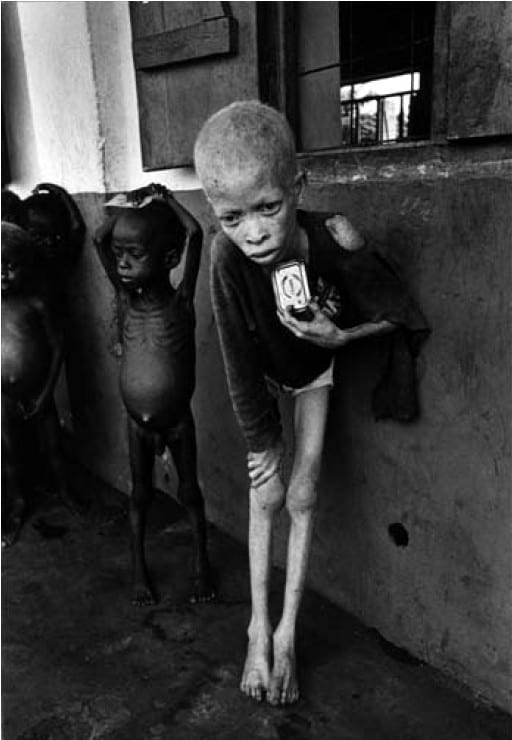
Global Map of the Empathic Imagination
 Imagine you had to invent a new kind of atlas which showed the extent of our planet’s economic and cultural globalization, and the interconnections between the world’s environmental crises. That’s the aim of the ATLAS of Interdependence, a project being masterminded by the new economics foundation, the Open University and Sheffield University. The ATLAS will be an evolving online resource containing entries from geologists, geographers, scientists, journalists, artists, campaigners and historians, each providing their personal vision of global interdependence. Here is a sneak preview of my own entry, called the Global Map of the Empathic Imagination. Do let me know if you think it needs any additional landmarks. Continue reading
Imagine you had to invent a new kind of atlas which showed the extent of our planet’s economic and cultural globalization, and the interconnections between the world’s environmental crises. That’s the aim of the ATLAS of Interdependence, a project being masterminded by the new economics foundation, the Open University and Sheffield University. The ATLAS will be an evolving online resource containing entries from geologists, geographers, scientists, journalists, artists, campaigners and historians, each providing their personal vision of global interdependence. Here is a sneak preview of my own entry, called the Global Map of the Empathic Imagination. Do let me know if you think it needs any additional landmarks. Continue reading
Monkeys, mirror neurons and the empathic brain
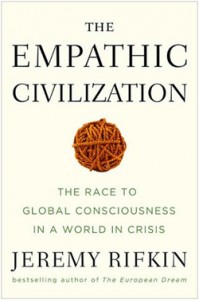 At a recent talk at the Royal Society of the Arts in London, the American economist and social critic Jeremy Rifkin gave a brilliant overview of his new book, The Empathic Civilization. Part of his argument that we should think about ourselves as Homo empathicus – empathic by nature – rests on some of the recent research in neuroscience that appears to demonstrate we have empathic brains. But what is the science really telling us? Continue reading
At a recent talk at the Royal Society of the Arts in London, the American economist and social critic Jeremy Rifkin gave a brilliant overview of his new book, The Empathic Civilization. Part of his argument that we should think about ourselves as Homo empathicus – empathic by nature – rests on some of the recent research in neuroscience that appears to demonstrate we have empathic brains. But what is the science really telling us? Continue reading
Election Special: Empathy and Immigration Policy
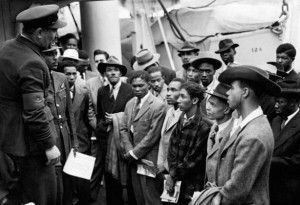
The upcoming British general election on May 6 raises the possibility for a new dawn in empathy-based politics. Or not. My review of the election manifestos of the major parties – Labour, Conservative, Liberal Democrat and Green – reveals that the word ‘empathy’ is not mentioned a single time in any of them (out of a total 356 pages of text). This is rather different from the last US presidential election, when Barack Obama mentioned ‘empathy’ in almost every speech he made. Continue reading
Should you empathise with your father's killer?

One of the greatest challenges of leading an empathetic life is trying to step into the shoes of people who we consider to be ‘enemies’ or whose views and values are very different from our own. If you’re on the receiving end of a racist comment from someone at the pub or a torrent of unfair verbal abuse from your boss, the idea of trying to empathise with them would probably be the last thing on your mind. If you came face to face with the person who had recently burgled your house, could you overcome your anger to see the crime from their perspective, and understand the circumstances that may have driven them to it?
Empathising in such instances might seem like wishful thinking. But consider the case of Jo Berry. Continue reading
Inside Obama’s Brain: In Conversation with Sasha Abramsky
 Sasha Abramsky is one of the most original and politically insightful investigative journalists writing in the US today. He is best known for books such as Hard Times Blues, a penetrating critique of the US prison system, and Breadline USA, which reveals the hidden scandal of everyday hunger and poverty faced by American families. He is also a Senior Fellow at the New York City-based Demos think tank. His new book, Inside Obama’s Brain, attempts to delve inside the mind of the 44th President. I spoke to him about the book, and the central role that empathy plays in Obama’s political vision.
Sasha Abramsky is one of the most original and politically insightful investigative journalists writing in the US today. He is best known for books such as Hard Times Blues, a penetrating critique of the US prison system, and Breadline USA, which reveals the hidden scandal of everyday hunger and poverty faced by American families. He is also a Senior Fellow at the New York City-based Demos think tank. His new book, Inside Obama’s Brain, attempts to delve inside the mind of the 44th President. I spoke to him about the book, and the central role that empathy plays in Obama’s political vision.
Continue reading
Why we need a Climate Futures Museum
When I think about what is likely to result from the global climate change talks taking place in Copenhagen this month, I feel nothing but despair. Why? Because whatever kind of deal is struck is highly unlikely to keep global warming below two degrees. The majority of people in rich countries simply don’t care enough about the issue to pressure their governments into extraordinary action. I believe one of the major reasons for this is the lack of empathy for those who will – or who currently – suffer from the impacts of climate change.
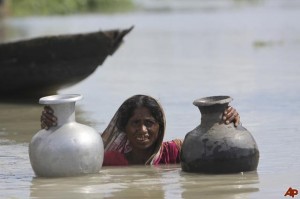
We should view the problem of tackling climate change not as an environmental issue, or one concerning technology or social justice or markets, but primarily as a problem of empathy. We must learn to see the individuals behind the newspaper headlines about global warming, and imagine ourselves into the uniqueness of their lives, developing an empathetic understanding of their most important experiences, beliefs, fears and hopes. Sound far-fetched, wishy-washy or a little too sandals-and-carrot-juice for your liking? Let me explain myself.
Continue reading
